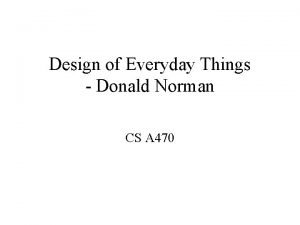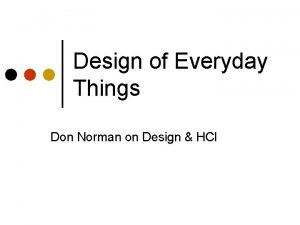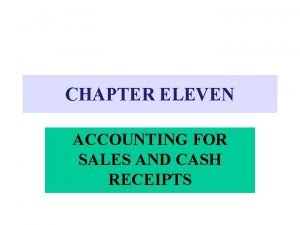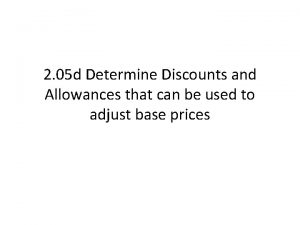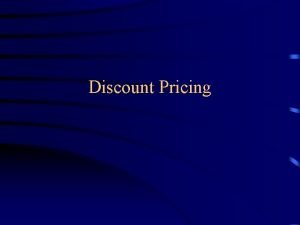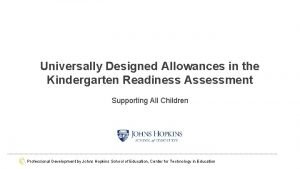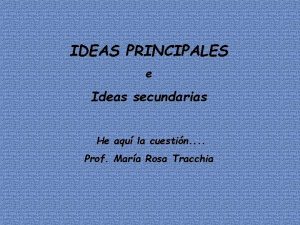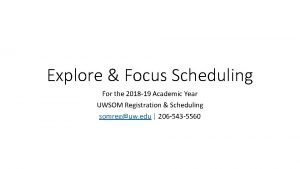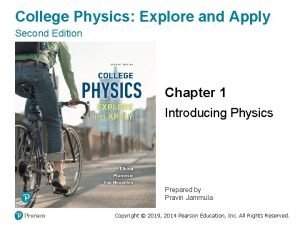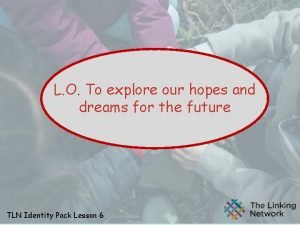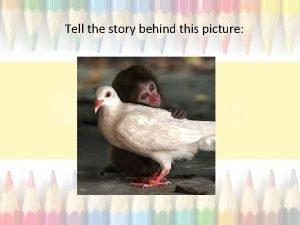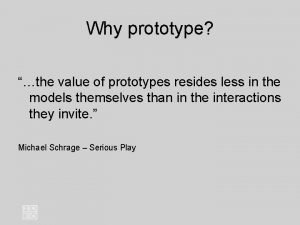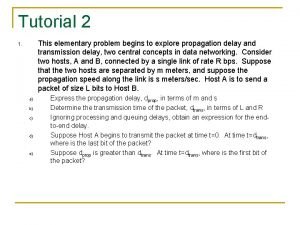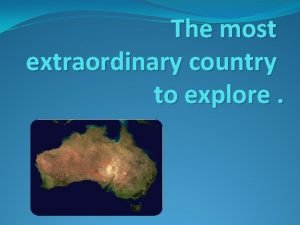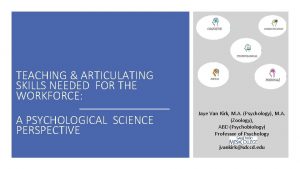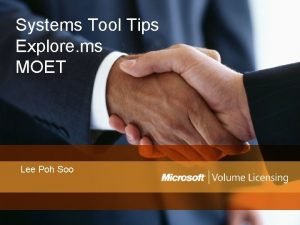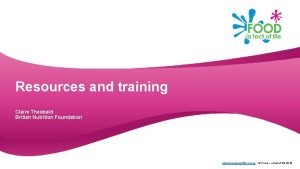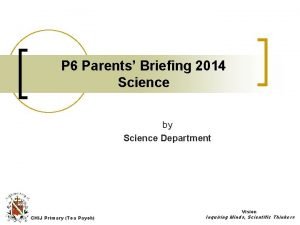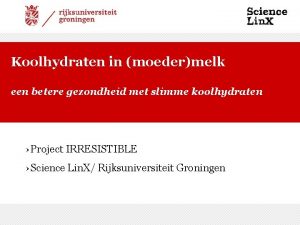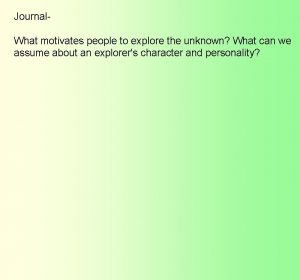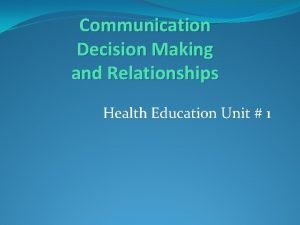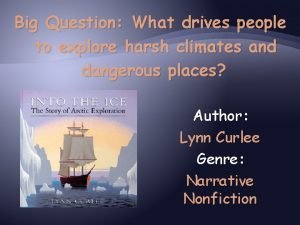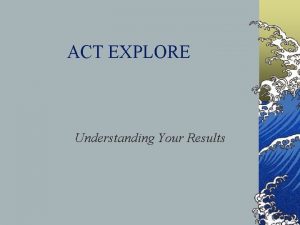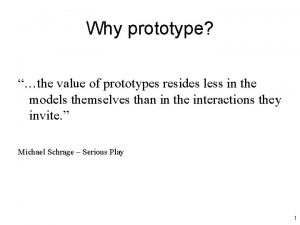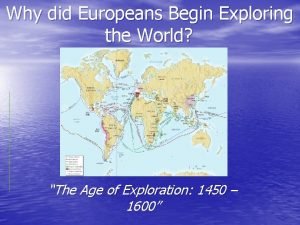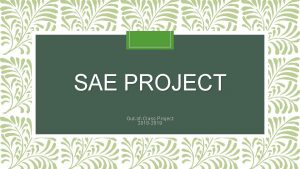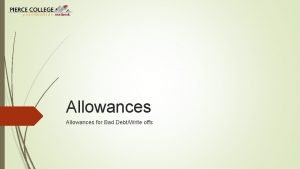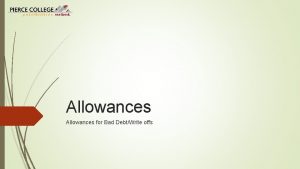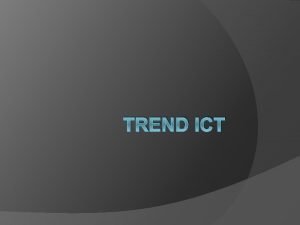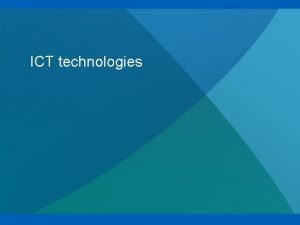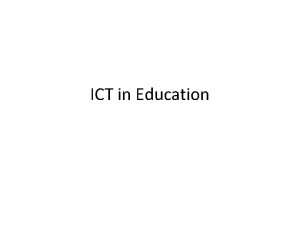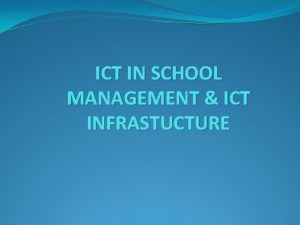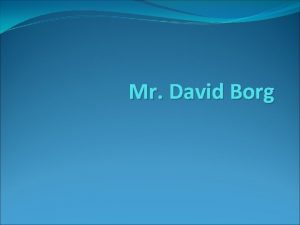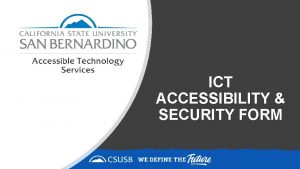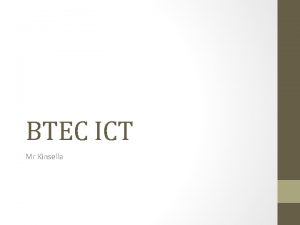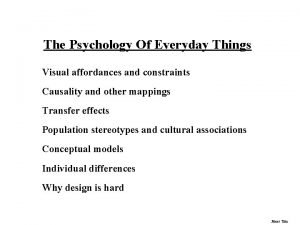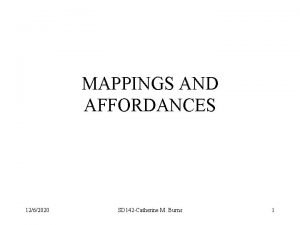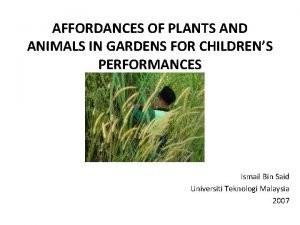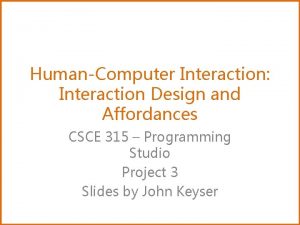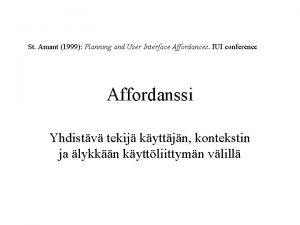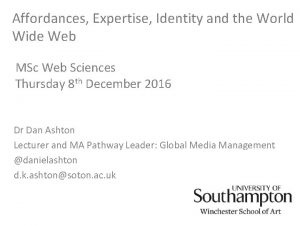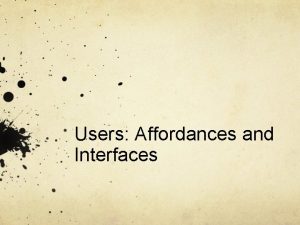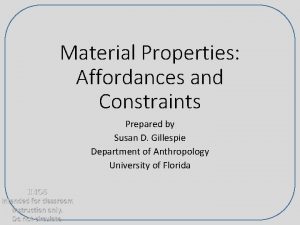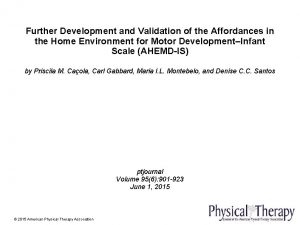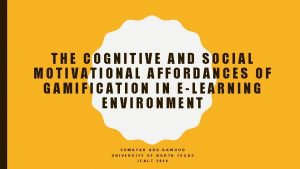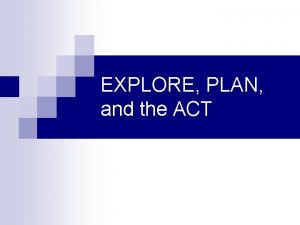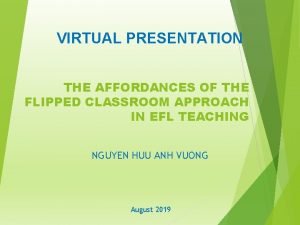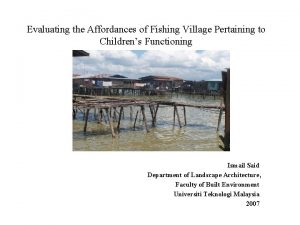Allowances and affordances of ICT Ideas to explore

































- Slides: 33


Allowances and affordances of ICT

Ideas to explore Choose your adventure A worked example Back stage ideas Ideas bank ICT as an assessment management tool • Assessing products and processes • • • Assessing ICT • Prac jobs – and your ICT certificate prep • ICT rich idea • Homework – example of linking to show This weeks tech spot Hypertext menus

A worked example Multi disciplinary Will use ICT for process and product Authentic Audience Read for meaning not mark Judge against standards on criteria

Year 4 Technology project • Task – In teams of 3, students will design a pop-up book for children in their family from an existing or new story, working digitally to design the book, develop pages and share their thinking about their learning.

Deep Understandings • Designing a product for an audience involves careful planning and meeting design specifications, as well as creativity and ingenuity. • Developing practical and useful solutions requires time, patience, determination and persistence to see the job through to the end • Successful digital work brings together software skills, file management skills, research skills, design and publishing skills and communication skills. • Communicating with young readers is about grabbing and keeping their attention, giving clear messages and helping them understand the story by using multiple techniques.

Ideas for assessment instruments How do you differentiate for children with diff learning needs?

Background ideas • Text chapter 6 especially 206 -208 222 -226 2 dim a u n i t n o c l a n o i s en

Purposes • Assessment has purpose and audience. – The assessment instrument and grading sheet/equivalent? – The students feedback from the assessment • Assess what students know and can do, rather than assess the content you taught. That is assess outputs not inputs • Summative verses formative Who might be the audience of your assessment instrument and the student work? How will you make judgements and provide feedback?

Qualities • Validity – does the instrument enable students to demonstrate qualities? Have you selected qualities that the curriculum expects students to demonstrate? • Reliability of judgements – do your criteria and standards produce reliability? Same for other grading approaches • Authentic audience improves quality. • Holistic verses analytical.

Pondering • Question – how does using ICT improve validity and reliability? In the following examples: – Using the student tracking of a LMS system? – Using online tests and exercises or quizzes etc – In a web quest? – In an ICT product project? – By diarising a process ( eg a writing process) – Others?

Pondering • What are examples of analytical assessment instruments (and their grading mechanisms)? • Think about student use of ICTs. What examples? • ICT examples?

Bank of ideas

Ideas Whole class Team/group Individual

How can assessment and pedagogy change when students use ICT? • What does technology enable students to do and demonstrate that can not be achieved on paper? http: //ace. schoolnet. org. za/cd/images/Core 1 A /assessment_cycle. jpg

Managing assessment with ICT • Using gradebook software or a spreadsheet/database • Using the tools of an LMS • Developing feedback documents for parents and students • Collaboration between markers – shared documents and spaces • Video and digital photos • Blogging or developing profiles of students • Auto- marking using test software • Others?

Group, whole class, individual • Multiple metaphors over tools • Portfolios • Blogs etc

Using ICT to assess • Portfolios and blogs • Questions and quizes • Guided examples to work from and get feedback Peer/self assessment • http: //ictandassessment 4 learning. wikispaces. com/ICT+Tools+to+support+Assessment+for+ Learning+practices

Process and products • The processes and subject matter from curriculum documents • ICT processes • ICT products

Assessing processes • Designing assessment to enable you to make judgements about digital processes • Designing assessment that enables you to make judgements about digitally-enhanced curriculum processes? How can you assess information literacy process – what task/activity/test? How do you assess a scientific process like capacity to hypothesise and test hypothesises. ? How does using technology change what students do and how you judge their scientific process skills?

Assessing products • What are some ideas for digital products? – show concept understanding – show problem solving etc – Show application of skills/knowledge in the subject area – Show ICT knowledge and skills and application

Group, whole class, individual • Multiple metaphors over tools • Portfolios • Blogs etc

Assessing ICT • Analytical verses holistic • Self assessment for learning path choice • Use of standards or Student competency documents • PISA testing

Assessing ICT • ICT skills and knowledge in isolation is not that useful. • Students apply skills to do other things • Carefully articulate what you making judgements about. • Standards for students • ICT Expectations documents

Prac and assessment • Give students, teachers and parents some feedback about ICT skills and applying ICT to other things eg information literacy or critical literacy • Offer to plan out (plan on a page) the development you would suggest the teacher tries to do for the remainder of the year.

More prac ideas Talk to the ICT coordinator • What are the best things the school is doing with ICT? What is their plan for the next two years for using ICT in curriculum and to change pedagogy? How do they decide? • What would they expect a first year teacher to do? • Check text chapter 7 around evaluating ICT use in schools http: //www. jcu. edu. au/cds/public/groups/eve ryone/documents/overview/175831. 3. jpg

What evidence do you need to gather for your ICT certificate. Professional values • I identify and participate in PD to improve my digital literacy and digital pedagogy • I use ICT to operate within teams and communicate for professional purposes

QCOT standards Standard 5: Assess and report constructively on student learning • Practice 5. 6 implement approaches, including the use of ICT , to effectively monitor, assess and document learning • Knowledge 5. 7 how to use ICT to access, manage and report on student learning Download ICT references from QCOT on my resources page

STANDARD 5 Look up the national standards FOCUS AREA 5. 1 Assess student learning 5. 2 Provide feedback to students on their learning 5. 3 Make consistent and comparable judgments 5. 4 Interpret student data 5. 5 Report on student achievement

ICT Rich idea Task based or problem based learning Digital products – along the journey or at the end Digital processes or processes enhanced by working digitally Could you achieve your idea without ICT – that is do you interpret your curriculum with an ICT lens? You use ICT pedagogically Students use ICT to learn

Homework • Ramble is important this week. • Look at the Interactive white board event • Find an activity or piece of software to use on a white board • Learn to use it with a computer and then be prepared to lead us to use it on a whiteboard • Authoring software for library whiteboard.

White board Workshop prep • Look at event by Haylee, Sarah, Alicia and Cassie http: //iwbs 4 ict. wordpress. com/2012/03/29/conclusi on/ Library - Promethean Board Download and play with Active classroom Software to create flip charts Check out Promethean Planet for downloadable resources

Next weeks lecture • • Rachel Powell, Madeline Wust ESL Bec Virgin Spec Ed Andrea Mc. Millan EC person
 Don norman affordances
Don norman affordances Don norman's design principles
Don norman's design principles Sales discounts income statement
Sales discounts income statement Berangkat
Berangkat Price discount and allowances
Price discount and allowances Capital allowances list c
Capital allowances list c Universally designed allowances
Universally designed allowances Ideas have consequences bad ideas have victims
Ideas have consequences bad ideas have victims Que son las ideas complementarias
Que son las ideas complementarias Uwsom explore and focus
Uwsom explore and focus College physics: explore and apply answers
College physics: explore and apply answers Explore goals and dreams for the future
Explore goals and dreams for the future Imagine and explore
Imagine and explore Explore evolve validate prototype
Explore evolve validate prototype This elementary problem begins to explore
This elementary problem begins to explore Kangaroo feet
Kangaroo feet Www.careeronestop.org/explore careers
Www.careeronestop.org/explore careers Explorems
Explorems Explore food a fact of life
Explore food a fact of life Engage explore explain elaborate evaluate
Engage explore explain elaborate evaluate Engage explore explain elaborate evaluate
Engage explore explain elaborate evaluate What motivates people to explore the unknown
What motivates people to explore the unknown How much money
How much money Explore the alternatives in decision making
Explore the alternatives in decision making What drives people to explore?
What drives people to explore? Why did europeans begin to explore
Why did europeans begin to explore Explore test scores
Explore test scores Explore evolve validate prototype
Explore evolve validate prototype Why did europeans begin to explore
Why did europeans begin to explore Qad explore
Qad explore 03 activity 1
03 activity 1 2-4 explore compound interest
2-4 explore compound interest Explore with tom
Explore with tom Explore sae.com
Explore sae.com
